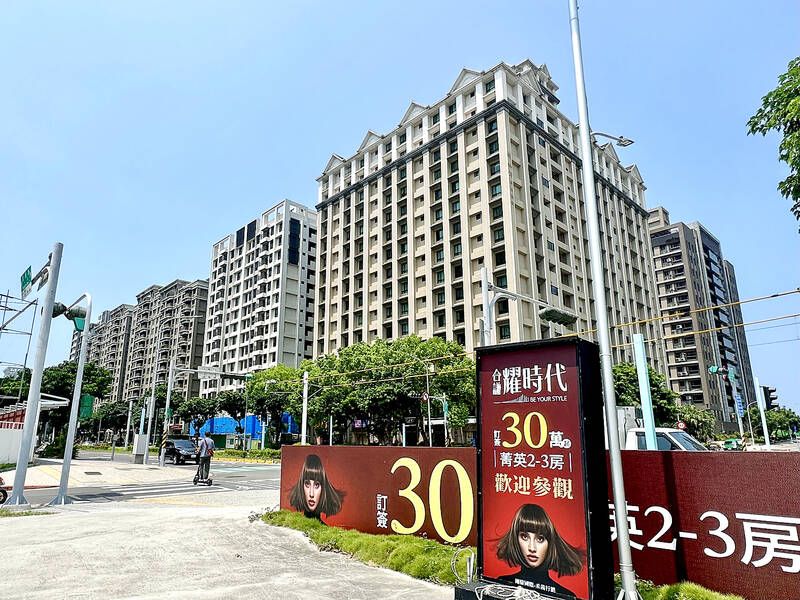H&B Realty Co (住商不動產) and Chinatrust Real Estate Co (中信房屋) yesterday reported steep declines in their house transactions last month, as the central bank’s latest credit control measures drove prospective buyers to the sidelines.
H&B observed a 26.4 percent retreat in its house deals nationwide last month from August, saying the fall widened to 28.6 percent compared with the same period last year.
H&B research manager Jessica Hsu (徐佳馨) attributed the poor showing squarely to the central bank’s latest credit controls under which home buyers would need to put up down payments of 50 percent to 70 percent if they already own real estate, even partial ownership of real estate gained from inheritance.

Photo: Hsu Yi-ping, Taipei Times
While tightened lending terms won’t affect first homes for self-occupancy, their review process has grown stricter and longer, which is also unfavorable for the market, Hsu said.
Tightened reviews came due to government suspicions about dummy buyers and other misuses of preferential lending terms designed to help people buy their first home for self-occupancy.
House transactions in Taipei tumbled 31.9 percent month-on-month, shrinking 30.9 percent and 41.4 percent in New Taipei City and Taoyuan respectively, H&B said, adding that Taichung recorded a 24.6 percent decrease.
The situation is less abysmal in southern Taiwan, where house deals fell 9.1 percent in Tainan and 9.8 percent in Kaohsiung, H&B found.
Likewise, Chinatrust observed a 15.9 percent fall in its house deals across Taiwan last month from August. The decrease stood at 12.3 percent year-on-year, it said.
House deals reduced 18.3 percent in Taipei, dropped 15.7 percent in New Taipei City and shrank 10.7 percent in Taoyuan, the broker said. The slowdown was 16.7 percent in Taichung, 18.5 percent in Tainan and 18.2 percent in Kaohsiung, it added.
House-buying fever in the first half of this year started to cool in August when the central bank indicated it met with local banks and cooperatives for talks about their mortgage operations.
The monetary policymaker repeatedly voiced concerns over a potential overconcentration of real estate lending, which it warned could squeeze loans for other sectors and pose a threat to the financial system’s health and stability, in the event of house price corrections.
Conservative sentiment grew more evident last month and might not dissolve any time soon, as many local lenders are approaching their house loan limit, Chinatrust said.
As before, investors would first feel the pinch and flee the market, leaving people with real demand to underpin deals, it said.
The situation would deteriorate, as the central bank said it would keep a tight rein for at least a year, though it could consider making exceptions for “innocent” buyers, if necessary, both H&B and Chinatrust said.

When an apartment comes up for rent in Germany’s big cities, hundreds of prospective tenants often queue down the street to view it, but the acute shortage of affordable housing is getting scant attention ahead of today’s snap general election. “Housing is one of the main problems for people, but nobody talks about it, nobody takes it seriously,” said Andreas Ibel, president of Build Europe, an association representing housing developers. Migration and the sluggish economy top the list of voters’ concerns, but analysts say housing policy fails to break through as returns on investment take time to register, making the

‘SILVER LINING’: Although the news caused TSMC to fall on the local market, an analyst said that as tariffs are not set to go into effect until April, there is still time for negotiations US President Donald Trump on Tuesday said that he would likely impose tariffs on semiconductor, automobile and pharmaceutical imports of about 25 percent, with an announcement coming as soon as April 2 in a move that would represent a dramatic widening of the US leader’s trade war. “I probably will tell you that on April 2, but it’ll be in the neighborhood of 25 percent,” Trump told reporters at his Mar-a-Lago club when asked about his plan for auto tariffs. Asked about similar levies on pharmaceutical drugs and semiconductors, the president said that “it’ll be 25 percent and higher, and it’ll

CHIP BOOM: Revenue for the semiconductor industry is set to reach US$1 trillion by 2032, opening up opportunities for the chip pacakging and testing company, it said ASE Technology Holding Co (日月光投控), the world’s largest provider of outsourced semiconductor assembly and test (OSAT) services, yesterday launched a new advanced manufacturing facility in Penang, Malaysia, aiming to meet growing demand for emerging technologies such as generative artificial intelligence (AI) applications. The US$300 million facility is a critical step in expanding ASE’s global footprint, offering an alternative for customers from the US, Europe, Japan, South Korea and China to assemble and test chips outside of Taiwan amid efforts to diversify supply chains. The plant, the company’s fifth in Malaysia, is part of a strategic expansion plan that would more than triple

Taiwanese artificial intelligence (AI) server makers are expected to make major investments in Texas in May after US President Donald Trump’s first 100 days in office and amid his rising tariff threats, Taiwan Electrical and Electronic Manufacturers’ Association (TEEMA, 台灣電子電機公會) chairman Richard Lee (李詩欽) said yesterday. The association led a delegation of seven AI server manufacturers to Washington, as well as the US states of California, Texas and New Mexico, to discuss land and tax issues, as Taiwanese firms speed up their production plans in the US with many of them seeing Texas as their top option for investment, Lee said. The